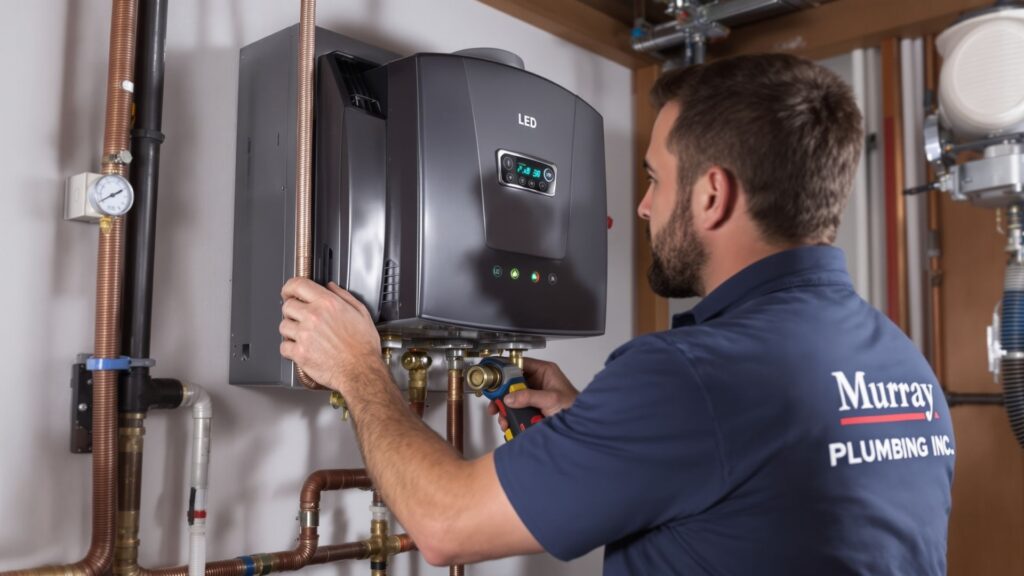Tankless Water Heater Installation & Repair in Central Pennsylvania

Endless Hot Water. Lower Energy Bills. Less Space.
Upgrade to a Tankless Water Heater with Murray Plumbing Inc.
Looking to modernize your home’s hot water system? Tankless water heaters are more efficient, longer-lasting, and provide hot water on demand — no storage tank required.
At Murray Plumbing Inc, we specialize in tankless water heater installation, repair, and maintenance for homes throughout Central Pennsylvania. Whether you’re upgrading or need service for your existing unit, we deliver fast, professional results. We also offer expert shower repair to keep your entire bathroom plumbing system running smoothly and efficiently.
What Is a Tankless Water Heater?
- Homes with high hot water usage
- Small homes with limited space
- Families tired of running out of hot water
- Eco-conscious homeowners looking to cut energy costs
Benefits of Going Tankless
If your water heater is still in decent condition, we can often perform quick, affordable repairs such as:
- Replacing faulty heating elements or thermostats
- Flushing sediment buildup
- Fixing leaking valves or connectors
- Thermocouple or gas control replacements
- Pilot light and ignition troubleshooting
- Resetting tripped circuit breakers
We service all major brands, including Rheem, Bradford White, AO Smith, Navien, and more — specializing in the installation and maintenance of energy-efficient tankless water heaters that deliver reliable performance and lower utility costs.
Tankless Water Heater Installation in Central PA
- Navien
- Rinnai
- Rheem
- Bosch
- Noritz
- Full removal of your old tank-style unit
- Gas, propane, or electric model installation
- Sizing and flow rate calculations
- Venting, gas line upgrades, and code compliance
- Digital controls setup and walk-through
Tankless Water Heater Repair & Maintenance
- No hot water
- Inconsistent water temperature
- Error codes or control panel issues
- Sediment buildup and flushing
- Flame or ignition failures
- Water flow sensor malfunctions
Tankless vs. Traditional – Which Is Right for You?
Feature
Tank Water Heater
Tankless Water Heater
Heating Method
On-demand
Stores hot water in a tank
Lifespan
15–20+ years
8–12 years
Energy Use
Lower
Higher standby loss
Hot Water
Endless
Can run out
Space
Compact
Bulky
Upfront Cost
Higher
Lower
Why Central PA Homeowners Trust Murray Plumbing
- Licensed & Certified Installers
- Gas & Electric Units
- Honest, No-Pressure Advice
- Local Technicians Who Know Central PA Homes
- Emergency Tankless Repairs Available
- Full Code Compliance & Permitting
Proudly Serving Central Pennsylvania
- Harrisburg
- Camp Hill
- Hershey
- Mechanicsburg
- New Cumberland
- Elizabethtown
- Linglestown
- And all surrounding Central PA areas
FAQs – Tankless Water Heaters
Q: Can I replace my existing tank water heater with a tankless one?
A: Yes, in most cases. We’ll inspect your gas, water, and venting setup to ensure compatibility.
Q: How much does it cost to install a tankless water heater?
A: Costs vary based on model, fuel type, and home layout — but we provide upfront quotes and options for every budget.
Q: Are tankless water heaters really more efficient?
A: Yes. You avoid standby heat loss and only heat water when needed — which reduces energy use and utility bills.
Q: What’s required for maintenance?
A: Yearly flushing (especially in hard water areas) and routine inspections. We offer maintenance plans for worry-free performance.
